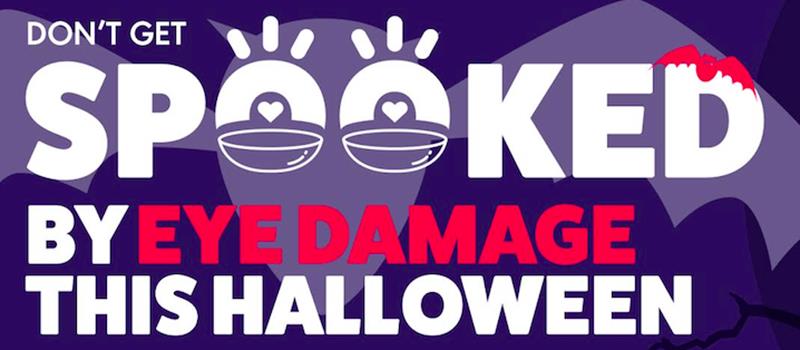The prospect of a corneal ulcer or keratitis makes even the scariest of Halloween outfits look tame.
But until illegally sold coloured and novelty contact lenses are swept off the street, the fear factor of resulting eye infections continues to haunt eye care professionals.
Last week the GOC issued a warning that cosmetic contact lenses were often being sold illegally on market stalls, joke shops and websites. The regulator noted that by law they should only be supplied under the supervision of a registered optician or doctor.
The AOP spearheaded a similar awareness drive earlier in the autumn when it invited optical practices to approach local retailers who were selling them illegally – providing them with a new leaflet. It represented a new approach whereby high street practitioners could take more action about an issue close to their hearts.
Eye health roulette
The GOC combined with Moorfields Eye Hospital to make its warning to party-goers this Halloween. And the youngest patients were most at risk.
Mr Badrul Hussain, consultant ophthalmic surgeon at Moorfields Eye Hospital NHS Foundation Trust, said: ‘Each year we treat patients, including children under 16, who have developed eye conditions after wearing cosmetic contact lenses. There can be an increase in these problems in the period around Halloween. Some of the cases we see, like patients sharing lenses with friends, wearing the same pair year after year well past the expiry date, and storing them in tap water, have devastating effects.
‘Most of the patients haven’t been shown how to look after their cosmetic lenses or their eyes properly. Not knowing the basics of using contact lenses safely can put you at higher risk of developing painful eye injuries, infections and in the worst cases, risk of permanent sight loss.’
These basics included having the lenses fit safely, washing and drying hands, not sleeping in contact lenses, or letting others try them on, and avoiding contact with water – fundamental compliance rules common to all contact lens products.
Meanwhile, this Halloween the BCLA enrolled beauty bloggers including Zoella, who has more than three million Twitter followers, make-up artists Pixiwoo and London Fashion Week regular Tanya Burr for a social media campaign focused on cosmetic lenses.
It said contact lenses that alter the colour of the eyes have become especially popular on the back of films including Twilight.
But BCLA president Keith Tempany warned: ‘By sharing coloured contact lenses young people are playing Russian roulette with their eye health and putting their sight at risk.’

Laying down the law
While police have the ultimate responsibility of snuffing out illegal sales of cosmetic contact lenses, market traders and members of the public have their own powers, according to National Market Traders Federation CEO Joe Harrison.
He said: ‘As the UK’s only national body for market and street traders, events retailers and hot food sellers, we would discourage traders from selling any products on an illegal basis.
‘We contain in our membership a liabilities protection cover for public, product and employers, however, this policy does not cover traders who are selling items illegally. We would suggest to the public that for their safety they make sure what they are buying is legal.’
Optician also asked the Trading Standards Institute how it was acting to discourage rogue sellers. While Trading Standards had worked to support the GOC it did not comment on the specifics or have any record of prosecutions relating to cosmetic contact lens sales.
Meanwhile, the AOP and GOC collaborated to produce the information leaflet, Do you know the law on selling contact lenses?, in September. The leaflet (see figure 1) was designed to resemble a formal cease and desist notice, so that optical practitioners could print and distribute to the relevant shops – either in person or through the letter box.
Alistair Bridge, GOC director of strategy, said: ‘In dealing with complaints about illegal practice, including cases involving the supply of zero-powered contact lenses, we follow our prosecution protocol. Often we find that sellers of cosmetic contact lenses are not aware of the law, or of the potential risks to patients if a registered optician or doctor is not involved in the sale. The first step to get them to cease illegal sales is therefore often as simple as letting them know what the law is.’
The collaboration follows an AOP position statement last year calling on the GOC to take a strong stance against those involved and demonstrate that sanctions can and will be taken against those who break the law.
‘As action is very rarely taken, the law provides little deterrent to those engaged in illegal practice. As a result, this undermines confidence in regulation and provides little protection to the public,’ its position statement said.
Since the leaflet was issued it has been downloaded 500 times from the AOP website alone – showing an appetite among eye care professionals to protect their patients.
AOP member Jason Searle, who used the leaflets, told Optician: ‘I found the leaflet/poster useful for summing up the main concerns of illegal contact lens supply regarding plano and cosmetic lenses as well as the legal aspects relating to it.
‘It allows light work of notifying local traders of the law and provides them a chance of ceasing their activities before involving the GOC. The availability of the document to both members and non-members means optometrists can help tackle these illegal activities with ease and promote the dangers of illegal supply.’
